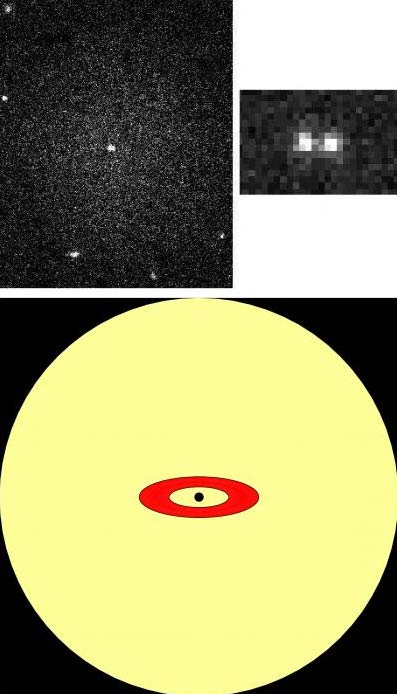Small Galaxy Packs Massive Black Hole

Supermassive black holes anchor most if not all large galaxies. But astronomers have been unsure whether very small galaxies tend to pack serious black holes at their centers.
A new discovery suggests they can.
Astronomers have found evidence of a massive black hole at the heart of a dwarf elliptical galaxy. The galaxy is just 1 percent the mass of our own Milky Way, and its black hole is estimated to be somewhere between 1 million to 50 million times the mass of our Sun. That's a lightweight compared to some supermassive black holes-which can be billions of times as massive as a star-but considerably more hefty than stellar black holes, which weigh only as much as a few suns.
The object, VCC128, is about 54 million light-years away in the Virgo Cluster of galaxies.
"It's a very small galaxy, on the outskirts of the cluster," said Victor Debattista, a postdoctoral researcher in astronomy at the University of Washington. "It is effectively the smallest galaxy in which there is a supermassive black hole."
The finding was presented in Seattle today at a meeting of the American Astronomical Society.
Black holes cannot be seen, because they trap matter and light. Debattista and colleagues detected the object in archived Hubble Space Telescope images. What they actually saw was a two blobs of light at the galaxy's center [image]. This double nucleus, as they call it, is actually two bright spots on a ring of stars that surround a very massive central object.
Breaking space news, the latest updates on rocket launches, skywatching events and more!
The discovery raises the question of whether other dwarf galaxies with bright centers might have massive black holes.
"The fact that we found a black hole is impressive because it's been thought that a galaxy this small should not be able to host a black hole," Debattista said. "It had been speculated that dwarf galaxies like this could not make black holes."
Editor's Note: All week, SPACE.com is providing complete coverage of the 209th meeting of the American Astronomical Society.
- Top 10 Star Mysteries
- The Strangest Things in Space
- All About Black Holes

Rob has been producing internet content since the mid-1990s. He was a writer, editor and Director of Site Operations at Space.com starting in 1999. He served as Managing Editor of LiveScience since its launch in 2004. He then oversaw news operations for the Space.com's then-parent company TechMediaNetwork's growing suite of technology, science and business news sites. Prior to joining the company, Rob was an editor at The Star-Ledger in New Jersey. He has a journalism degree from Humboldt State University in California, is an author and also writes for Medium.
